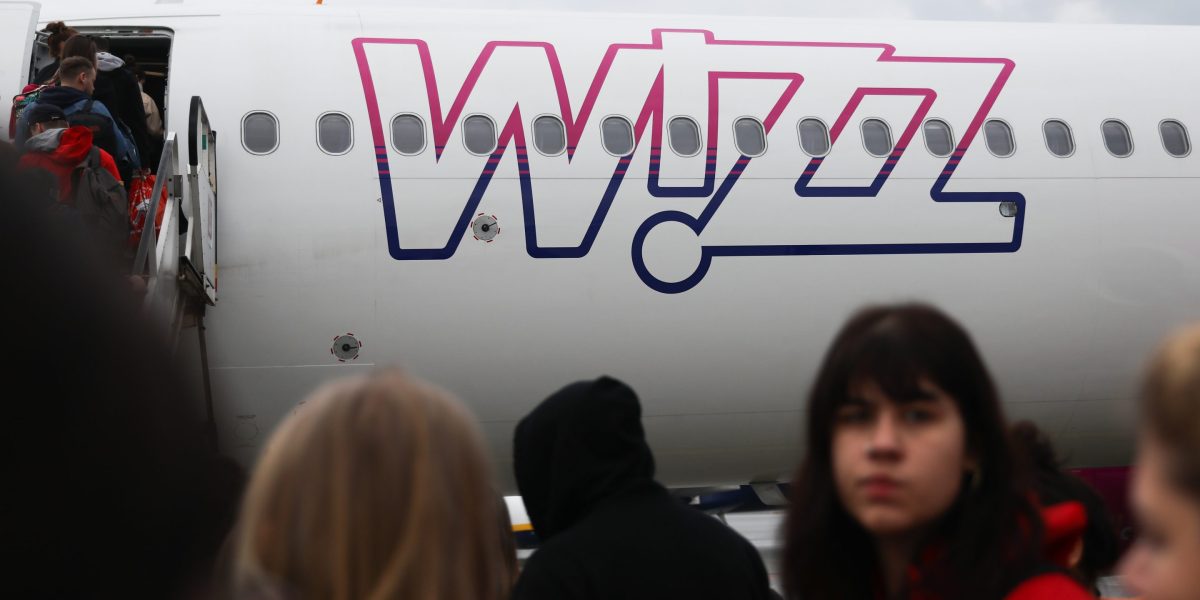With the outlook for travel weakening as consumers pull back on spending, short sellers are betting that one budget airline will fare worse than its European peers.
Shares out on loan, an indication of short interest, represent 13% of Wizz Air Holdings Plc’s stock available for trading, according to the latest data from S&P Global Market Intelligence. That compares to less than 1% for rivals EasyJet Plc and Ryanair Holdings Plc.
Skeptics point to plenty of reasons for the bearish bets: Wizz Air is loaded up with a lot more debt than its competitors, it’s been hit by an engine issue in Airbus SE planes it operates and the Budapest-based carrier flies mainly in and from eastern Europe, putting it close to war-torn Ukraine.
The stock, which trades in London, has already fallen 41% this year to 1,311 pence, weighed down by a profit warning in August, and some analysts say it very well could stumble again, given the fare competition among carriers.
“There’s a lot of uncertainty about Wizz’s ability to meet full-year guidance,” said Sathish Sivakumar, an analyst at Citigroup Inc. He’s one of five analysts tracked by Bloomberg who has a sell rating on the stock, a stance he has held since October of last year.
A Wizz Air spokesperson declined to comment on the bearish bets on the stock.
The carrier is among those that have been the hardest hit by engine problems that required its Airbus A321 aircraft to be pulled in early for maintenance. With aircraft availability uncertain, Wizz Air has leased flight-ready planes to preserve its schedule, cutting into profit.
It’s also been suffering from price wars, with Ryanair predicting ticket prices could fall even further, while indebtedness is also an issue, said Gerald Khoo of Panmure Liberum, who also has a sell on the stock.
“One of the big differentiating factors between Wizz Air on the one hand, and Ryanair and EasyJet on the other, is leverage,” Khoo said in e-mailed comments.
Wizz Air’s net debt is equal to 4.6 times its annual earnings, while Ryanair and EasyJet have net cash, giving them much more financial flexibility.
Investors’ preference for Wizz Air’s rivals is reflected in valuations. They’re willing to pay 10.7 times earnings for Ryanair and 7.6 times for EasyJet, compared with a multiple of 5.3 for Wizz Air.
Analysts, too, prefer EasyJet and Ryanair to Wizz Air, based on their consensus rating — an average of the buy, sell and hold recommendations.
Still, analysts overall are optimistic on the stock, which has nine buy ratings and 10 holds to go with the five sells. Their average price target of 1,982 pence implies a 51% return over the next year.
One bull, Ruairi Cullinane at RBC Capital Markets, says he’s looking for Wizz Air to improve its margins back toward pre-pandemic levels. That could come to pass in fiscal 2026 if the company can return to capacity growth and has a more favorable fleet mix, Cullinane said.
Still. RBC’s profit estimates sit toward the bottom end of Wizz Air’s guidance range for this fiscal year, which ends in March, “implying risks to current-year guidance,” said the analyst, who has an outperform rating on the stock and sees it doubling in the next year.
Wizz Air has been taking steps to boost profits again, in part by launching a longer-haul, no-frills flight to Saudi Arabia next year, Chief Executive Officer Jozsef Varadi said in an interview last week.

